Almond milk has become a popular substitute in many people’s diets. Those who are lactose-intolerant and those who want to improve their nutritional habits are choosing almond milk over dairy. Naturally, when a new food product fascinates us with its health benefits, we wonder if it’s safe for our pets too.
You may have asked yourself, can my kitten drink almond milk? Or, is almond milk harmful to kittens? Generally, yes your kitten can drink almond milk. But it probably shouldn’t – at least not in large quantities. This article will be your guide to almond milk and how it affects your feline friends.
What is Almond Milk?
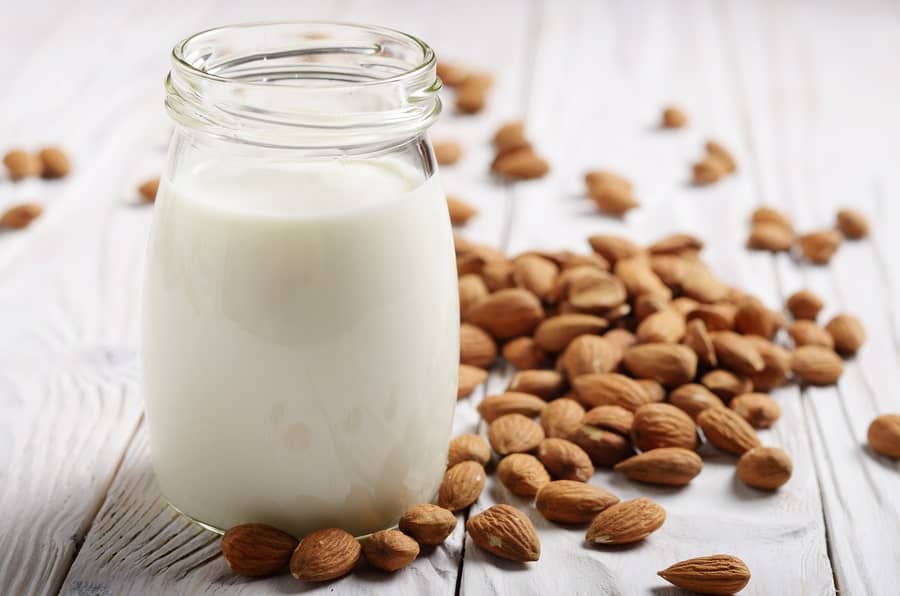
Almond milk is a popular substitute for cow’s milk, appealing to vegan and lactose intolerant diets. Almond milk is made by crushing up almonds and mixing the resulting pulp with water.
This mixture is drained and the leftover fluid is collected and packaged into almond milk. Often, preservatives and artificial sweeteners are added.
The almonds are already lower in nutrients from the crushing process; the addition of sweeteners makes the almond milk on the shelves at the supermarket slightly more unhealthy.
That’s not to say almond milk isn’t a healthy alternative to cow’s milk. Indeed, almond milk contains no cholesterol or saturated fat, and it packs more protein than traditional dairy milk.
You just have to carefully read the labels of the almond milk you purchase to be sure these nefarious ingredients aren’t lurking inside.
Almond milk has also become a popular choice because of its creamy texture and nutty flavor. Drunk by itself or used in shakes and smoothies, it is a veritable replacement for cow’s milk in some cases.
As consumer demand has risen, though, many have questioned the sustainability of producing almond milk.
American almond production takes place largely in California, which has been besieged with droughts off and on for the last two decades.
Almond growers are concerned the water levels aren’t enough to sustain the number of almonds needed to meet the demands for almond milk.
This may not pose such a problem for the consumer, however. Other imitation milks, like soy milk, wheat milk, rice milk, and coconut milk are more widely available than before.
The choice between myriad types of imitation milk could curb the demand for almond milk.
Is Almond Milk Harmful to Kittens?
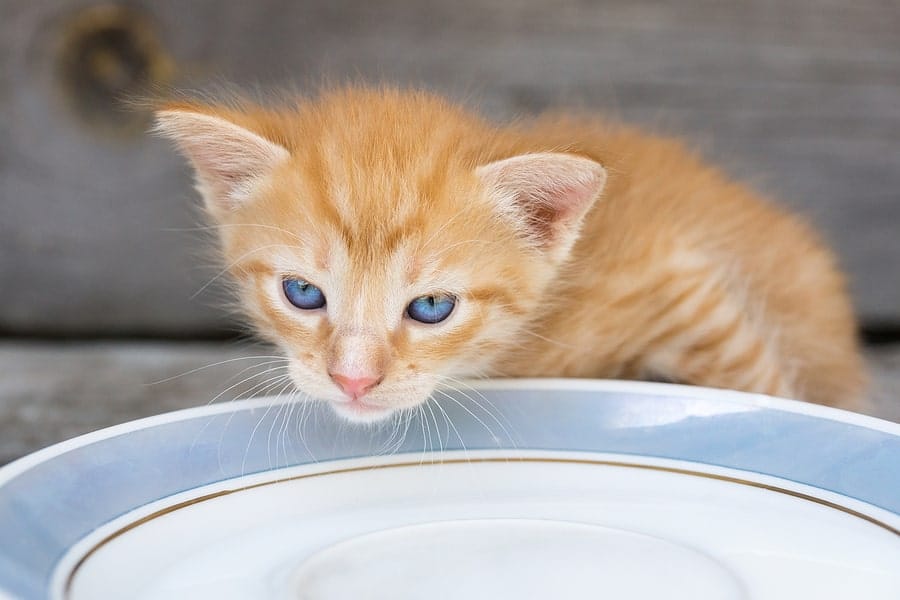
For most humans, choosing to drink almond milk or another imitation milk does not pose health risks. Can the same be said for our furry friends?
Let’s start by dispelling a common myth, that cats love milk.
In fact, cats are lactose intolerant, and giving them cow’s milk will make them sick – gas, bloating, diarrhea, vomiting. With that in mind, you might wonder if it’s safe to give your cats and kittens imitation milk instead.
As with humans, the answer is it depends. Almond milk does not represent a healthier alternative to cow’s milk just because it’s been made with almonds.
You must be selective when purchasing your almond milk. If you’re drinking almond milk for the health benefits, then ensure there are no artificial sweeteners that bump up the calories. These pernicious ingredients will harm your kitten, too.
Adding milk of any kind to a kitten’s diet runs risks because milk is high in calories. Adult cats only need about 200 calories per day.
One cup of dairy milk, whole, is 149 calories! One cup of unsweetened almond milk is only 39. However, that still takes up 20% of your cat’s daily diet.
Giving your cat almond milk as a small treat won’t pose too much of a risk. But using almond milk to supplement your cat’s nutrients is a futile exercise.
The omega-3 fatty acids, vitamin D, and calcium found in almond milk are great for your cat, but if you’re feeding your furry friend the right food then they should have enough of these nutrients in their diet already.
You might still be wondering, is almond milk harmful to kittens? It’s probably best to avoid almond milk altogether with kittens since they have even more delicate digestive systems than adult cats.
Some Precautions to Consider with Kittens and Almond Milk
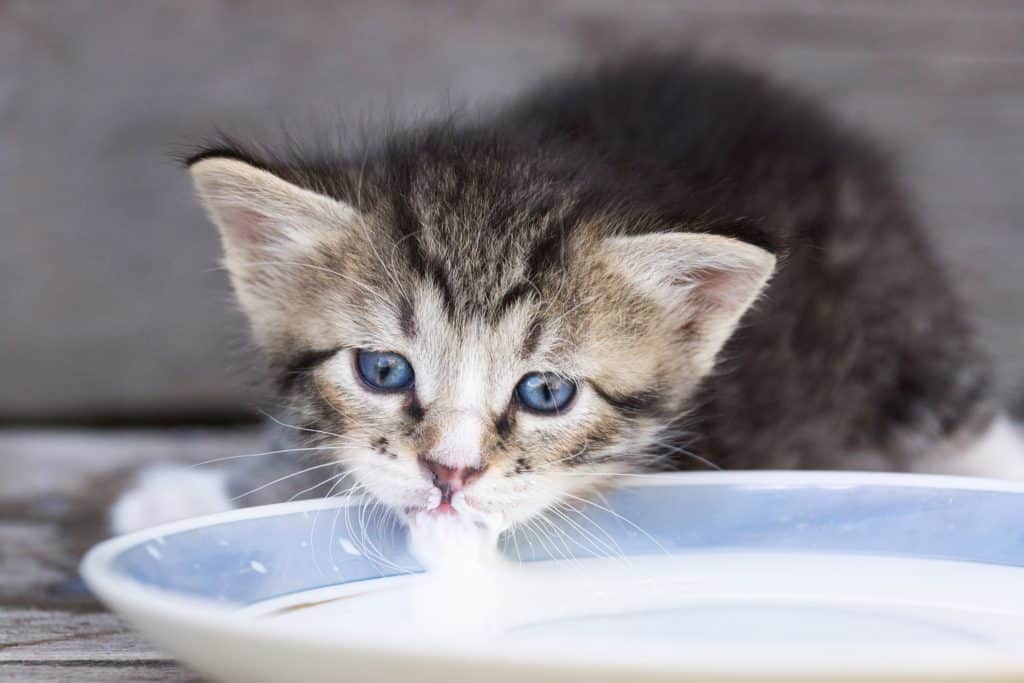
The biggest precaution to take with giving your cat almond milk is, of course, moderation. Any time you introduce a new element in your pet’s diet, start small. If they react well, you can give them another small portion and go from there.
A small portion would be 1/4 cup or less. Never give your cat more than 4 cups of almond milk in a 24 hour period.
If it reacts badly, obviously you should cut off the drink. A bad reaction to almond milk could be a nut allergy. With cats, this manifests as stomach pain, gas, bloating, or diarrhea.
It can be hard to tell if your cat has stomach pain, though, if there are no physical systems. If your cat seems irritable after having drunk the almond milk, odds are it did not like it.
Another precaution to take is checking the ingredients of your almond milk. You might enjoy that extra vanilla flavoring but it adds calories and could be harmful to your pet.
Additionally, cats tend to dislike sugary foods. If you offer sweetened almond milk to your kitty, it might not even be interesting.
Moderation and checking ingredients are the most important precautions for giving your kitten almond milk.
Keep in mind that most household pets are not made to consume dairy or almond milk, so the nutrients we humans reap from them aren’t beneficial to our animals.
If My Kitten Accidentally Drinks Too Much Almond Milk
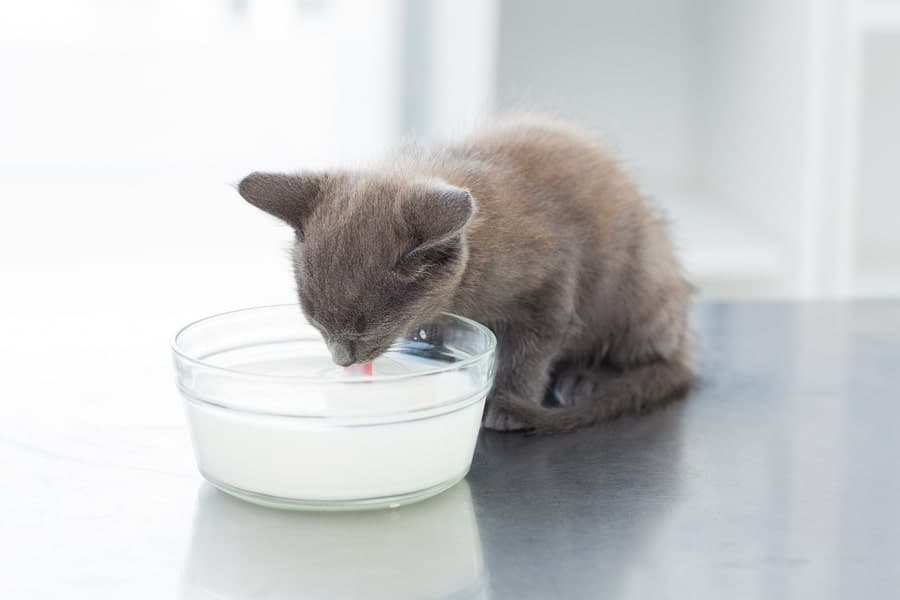
The best way to avoid your kitten drinking too much almond milk is to not leave bowls or cartons of it sitting out for the cat to reach. If you’re giving your cat almond milk only in small portions, this won’t be a problem.
If your kitty drinks too much almond milk by accident, however, you don’t have an instantaneous way of knowing if it negatively affects them. You will have to wait and see how your pet reacts.
Your cat might have a nut allergy, but you won’t know until you see the symptoms – gas bloating, diarrhea. If your kitty has these strong reactions to the almond milk, seek your vet’s help right away.
If your cat seems to lack any reaction – no upset stomach, no irritability, it keeps eating normally – then you will not have to act. Just prevent giving the same accident from happening twice!
Even if your cat’s digestive tract can handle the almond milk, or it does not have a nut allergy, it can gain extra weight if it drinks too much.
This “wait and see” process is the only approach you can take if you think your cat has lapped up too much almond milk.
Since it only adversely affects some cats, based on their eating habits and particular digestive systems, all you can do is wait to find out how your cat handles it.
This might seem a little cruel, but it’s also the way humans determine if they have food allergies and sensitive GI tracts – trial and error.
Health Benefits of Almond Milk
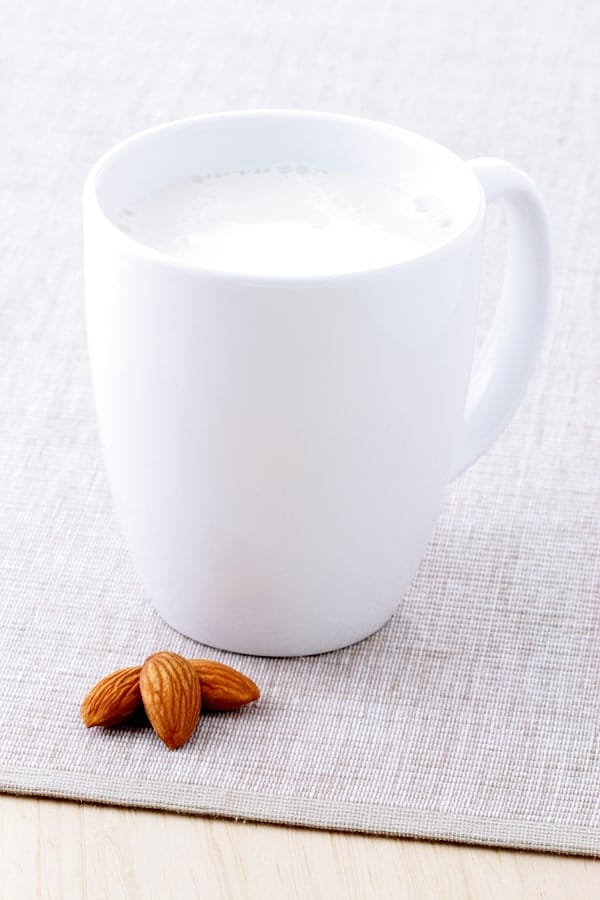
Almond milk can be a healthy alternative to cow’s milk for humans, given you pick the right almond milk. As we saw before, the antioxidants that whole almonds provide are stripped away when the milk is strained. If you make your own almond milk at home, it will contain more nutrients than commercial almond milk, which is often diluted.
In order to raise the nutritional value of almond milk closer to that of cow’s milk, protein, vitamin D, and calcium are added to it. Almond milk is naturally rich in vitamin E, though.
Almond milk is lower in calories than dairy milk, too. The calorie count depends on the number of almonds used since whole almonds are very high in fat.
Unsweetened almond milk also prevents spikes in blood sugar levels (as it’s higher in protein) and is low in carbohydrates.
Almond milk has also been linked to a reduced risk in heart disease since it’s high in vitamin E and healthy fats.
Drinking almond milk with discretion can, therefore, produce significant health benefits for humans.
And for cats? Since your feline friend shouldn’t be drinking as much almond milk as you, their nutritional benefits are much lower.
All the minerals and vitamins that your cat could possibly obtain from almond milk can be taken from decent cat food.
If you are concerned about your kitty’s nutrition, reevaluate your cat food and cat-specific treats first asking, can my kitten drink almond milk?
It just goes to show, that even if something is beneficial to you, it may not be so for your pet.
The desire to take care of your is cat understandable, but you don’t have to share everything you love with your kitty.
The best way to show love and affection to your little furry friend is by giving it proper foods and drinks.
A healthy kitty is a happy kitty!
Related Kitten Keeping Posts
13 Kitten Keeping Must-haves
- High Protein Grain-Free Dry Kitten Food
- High Protein Grain-Free Wet Kitten Food
- Stainless Steel Food and Water Bowl
- Kitten Health Record Keeper
- Van Ness Small Litter Pan
- Kitten Training Cat Litter
- Kitten Dental Care Toothbrush Toy
- Cat Tongue Textured Grooming Brush
- Pioneer Pet Ultimate Scratching Post
- Kitty City Cat Tunnel Bed
- Cat Tracks Chasing Balls Cat Toy
- Rainbow Cat Dancer Toy
- KitNipBox – Monthly Cat Subscription Box of Cat Toys, Treats and Goodies
